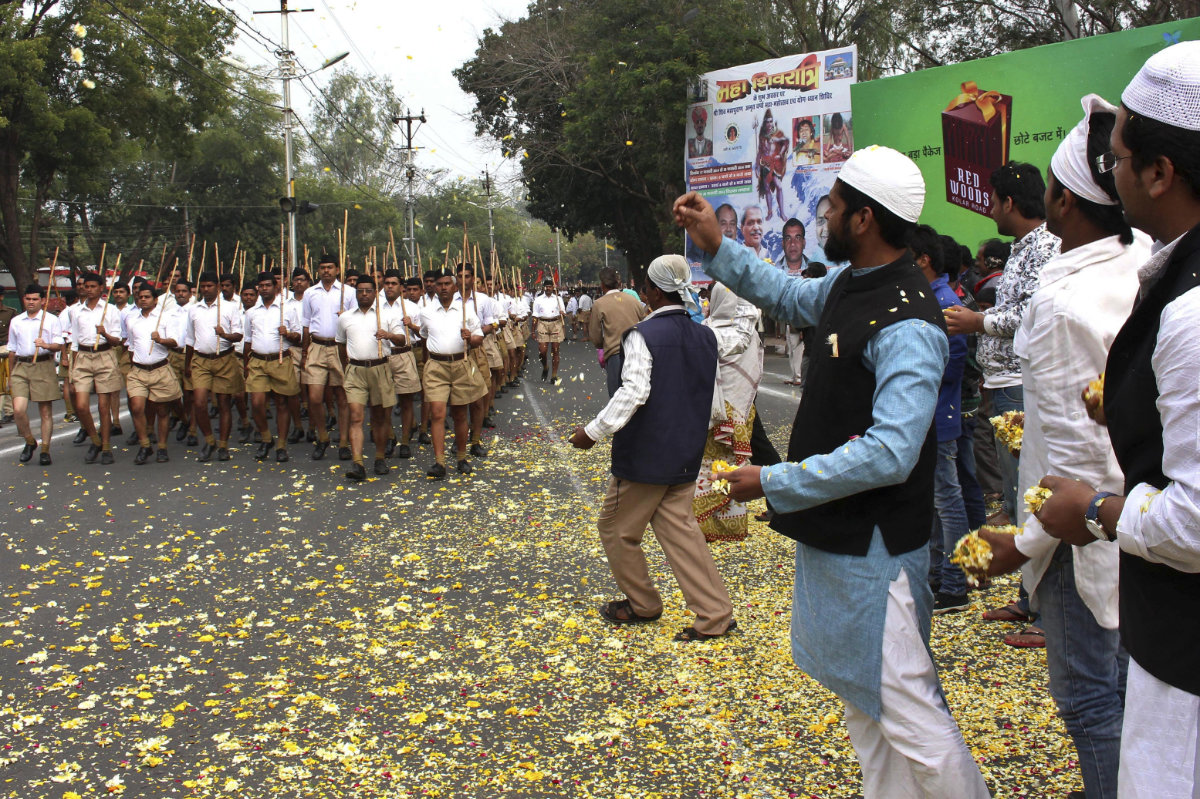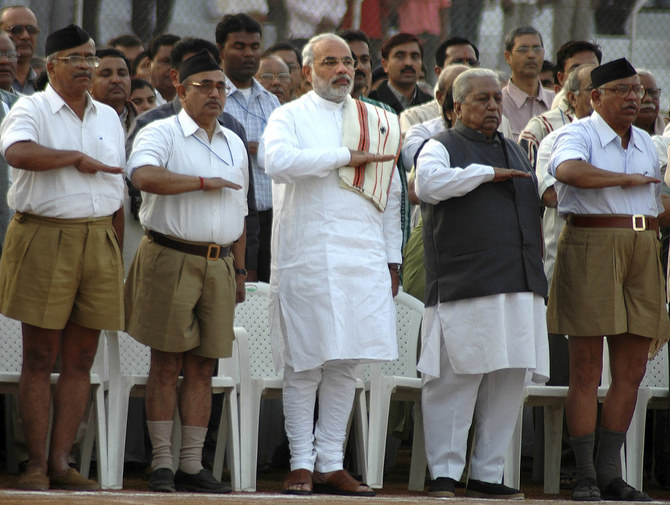AHMEDABAD, India: Hindu nationalism, once a fringe ideology in India, is now mainstream. Nobody has done more to advance this cause than Prime Minister Narendra Modi, one of India’s most beloved and polarizing political leaders.
And no entity has had more influence on his political philosophy and ambitions than a paramilitary, right-wing group founded nearly a century ago and known as the RSS.
“We never imagined that we would get power in such a way,” said Ambalal Koshti, 76, who says he first brought Modi into the political wing of the Rashtriya Swayamsevak Sangh in the late 1960s in their home state, Gujarat.
Modi was a teenager. Like other young men — and even boys — who joined, he would learn to march in formation, fight, meditate and protect their Hindu homeland.
A few decades earlier, while Mahatma Gandhi preached Hindu-Muslim unity, the RSS advocated for transforming India — by force, if necessary — into a Hindu nation. (A former RSS worker would fire three bullets into Gandhi’s chest in 1948, killing him months after India gained independence.)
Modi’s spiritual and political upbringing from the RSS is the driving force, experts say, in everything he’s done as prime minister over the past 10 years, a period that has seen India become a global power and the world’s fifth-largest economy.
At the same time, his rule has seen brazen attacks against minorities — particularly Muslims — from hate speech to lynchings. India’s democracy, critics say, is faltering as the press, political opponents and courts face growing threats. And Modi has increasingly blurred the line between religion and state.
At 73, Modi is campaigning for a third term in a general election, which starts Friday. He and the ruling Bharatiya Janata Party are expected to win. He’s challenged by a broad but divided alliance of regional parties.
Supporters and critics agree on one thing: Modi has achieved staying power by making Hindu nationalism acceptable — desirable, even — to a nation of 1.4 billion that for decades prided itself on pluralism and secularism. With that comes an immense vote bank: 80 percent of Indians are Hindu.
“He is 100 percent an ideological product of the RSS,“in said Nilanjan Mukhopadhyay, who wrote a Modi biography. “He has delivered their goals.”

In this Feb. 23, 2014 file photo, Indian Muslims shower flower petals as volunteers of Hindu nationalist group Rashtriya Swayamsevak Sangh, (RSS), march on the concluding day of their three-day meeting in Bhopal, India. For the RSS, Indian civilization is inseparable from Hinduism. (AP Photo/Rajeev Gupta, File)
Uniting Hindus
Between deep breaths under the night sky in western India a few weeks ago, a group of boys recited an RSS prayer in Sanskrit: “All Hindus are the children of Mother India ... we have taken a vow to be equals and a promise to save our religion.”
More than 65 years ago, Modi was one of them. Born in 1950 to a lower-caste family, his first exposure to the RSS was through shakhas — local units — that induct boys by combining religious education with self-defense skills and games.
By the 1970s, Modi was a full-time campaigner, canvassing neighborhoods on bicycle to raise RSS support.
“At that time, Hindus were scared to come together,” Koshti said. “We were trying to unite them.”
The RSS — formed in 1925, with the stated intent to strengthen the Hindu community — was hardly mainstream. It was tainted by links to Gandhi’s assassination and accused of stoking hatred against Muslims as periodic riots roiled India.
For the group, Indian civilization is inseparable from Hinduism, while critics say its philosophy is rooted in Hindu supremacy.
Today, the RSS has spawned a network of affiliated groups, from student and farmer unions to nonprofits and vigilante organizations often accused of violence. Their power — and legitimacy — ultimately comes from the BJP, which emerged from the RSS.
“Until Modi, the BJP had never won a majority on their own in India’s Parliament,” said Christophe Jaffrelot, an expert on Modi and the Hindu right. “For the RSS, it is unprecedented.”
Scaling his politics
Modi got his first big political break in 2001, becoming chief minister of home state Gujarat. A few months in, anti-Muslim riots ripped through the region, killing at least 1,000 people.
There were suspicions that Modi quietly supported the riots, but he denied the allegations and India’s top court absolved him over lack of evidence.
Instead of crushing his political career, the riots boosted it.
Modi doubled down on Hindu nationalism, Jaffrelot said, capitalizing on religious tensions for political gain. Gujarat’s reputation suffered from the riots, so he turned to big businesses to build factories, create jobs and spur development.
“This created a political economy — he built close relations with capitalists who in turn backed him,” Jaffrelot said.
Modi became increasingly authoritarian, Jaffrelot described, consolidating power over police and courts and bypassing the media to connect directly with voters.
The “Gujarat Model,” as Modi coined it, portended what he would do as a prime minister.
“He gave Hindu nationalism a populist flavor,” Jaffrelot said. “Modi invented it in Gujarat, and today he has scaled it across the country.”
A few decades earlier,
In June, Modi aims not just to win a third time — he’s set a target of receiving two-thirds of the vote. And he’s touted big plans.
“I’m working every moment to make India a developed nation by 2047,” Modi said at a rally. He also wants to abolish poverty and make the economy the world’s third-largest.
If Modi wins, he’ll be the second Indian leader, after Jawaharlal Nehru, to retain power for a third term.
With approval ratings over 70 percent, Modi’s popularity has eclipsed that of his party. Supporters see him as a strongman leader, unafraid to take on India’s enemies, from Pakistan to the liberal elite. He’s backed by the rich, whose wealth has surged under him. For the poor, a slew of free programs, from food to housing, deflect the pain of high unemployment and inflation. Western leaders and companies line up to court him, turning to India as a counterweight against China.
He’s meticulously built his reputation. In a nod to his Hinduism, he practices yoga in front of TV crews and the UN, extols the virtues of a vegetarian diet, and preaches about reclaiming India’s glory. He refers to himself in the third person.
P.K. Laheri, a former senior bureaucrat in Gujarat, said Modi “does not risk anything” when it comes to winning — he goes into the election thinking the party won’t miss a single seat.
The common thread of Modi’s rise, analysts say, is that his most consequential policies are ambitions of the RSS.
In 2019, his government revoked the special status of disputed Kashmir, the country’s only Muslim-majority region. His government passed a citizenship law excluding Muslim migrants. In January, Modi delivered on a longstanding demand from the RSS — and millions of Hindus — when he opened a temple on the site of a razed mosque.
The BJP has denied enacting discriminatory policies and says its work benefits all Indians.
Last week, the BJP said it would pass a common legal code for all Indians — another RSS desire — to replace religious personal laws. Muslim leaders and others oppose it.
But Modi’s politics are appealing to those well beyond right-wing nationalists — the issues have resonated deeply with regular Hindus. Unlike those before him, Modi paints a picture of a rising India as a Hindu one.
Satish Ahlani, a school principal, said he’ll vote for Modi. Today, Ahlani said, Gujarat is thriving — as is India.
“Wherever our name hadn’t reached, it is now there,” he said. “Being Hindu is our identity; that is why we want a Hindu country. ... For the progress of the country, Muslims will have to be with us. They should accept this and come along.”



























